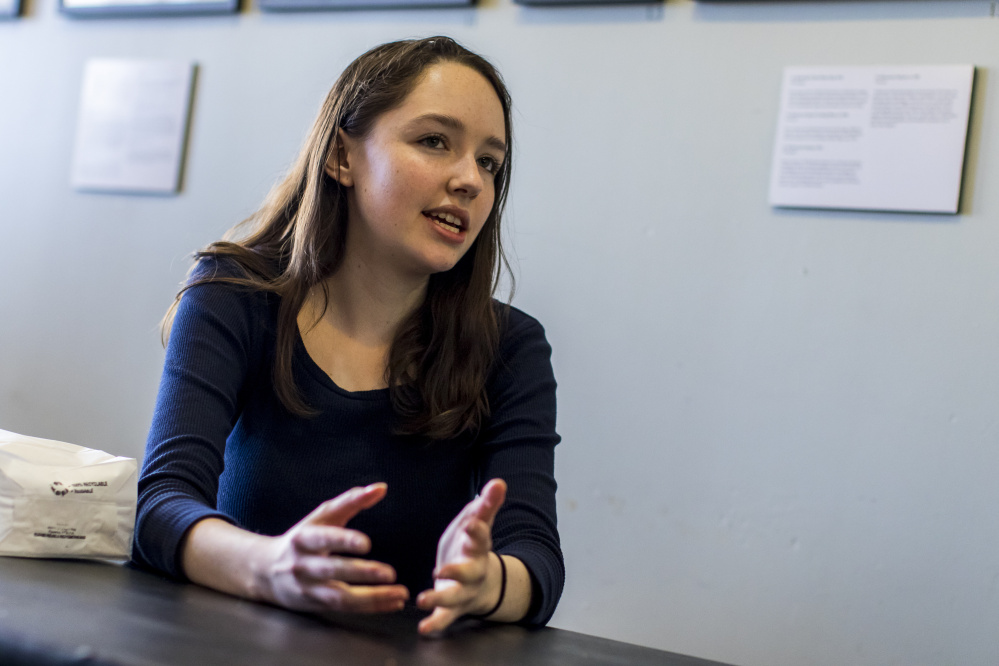When 16-year-old Connor Mullen complained recently that he had been taunted by students and teachers at South Portland High School after wearing a baseball cap supporting Donald Trump, it was the boiling point of an unusually intense political atmosphere among teenagers.
This year’s presidential campaign has captivated teenagers’ attention like few before it. Wall-to-wall media coverage, unorthodox candidates and a charged political atmosphere are drawing the entire country’s attention, and that has filtered down to teenagers, even those who won’t be eligible to vote in November. For some, the 2016 election marks the first time they will be able to vote.
“Some years, I have to really fan the flames to get students excited about the presidential campaign. Not this year,” said Ted Jordan, a social studies teacher who teaches an Advanced Placement government course at Cape Elizabeth High School.
The reason for the interest is clear, Jordan said: Trump, a Republican, and Vermont Sen. Bernie Sanders, who is seeking the Democratic nomination, break the mold of the typical politician.
“They are candidates that are against the system, against the establishment,” Jordan said.
At Portland High School, students said politics are a constant source of discussion, and the debates can get heated. The student body is divided between Sanders and Trump supporters. Democrat Hillary Clinton and Republicans Ted Cruz and John Kasich are barely scratching out support.
“A lot of teachers have gotten annoyed because all we do is talk about politics,” said Madison Snyder, a 17-year-old junior who supports Sanders. She said most students feel the same way, but other students said Sanders only appears to have the most support because he has the loudest backers.
“Outspoken people are for Bernie – that’s why you hear it the most,” said junior Peter Barry, 17.
Reed Foehl, a 16-year-old Portland sophomore, said students back Sanders because supporting Clinton is unpopular.
“If you support Hillary, there is a lot of peer pressure,” Foehl said. “People say, ‘Why do you support her? She’s evil.’ ”
Students said political debate is usually civil but occasionally turns into arguments. Most times, conflict surfaces between Trump and Sanders supporters. Often, teenagers pretend to support Trump because they know it will provoke others.
“People do it as a joke, just to get back at other people,” said Charles Egeland, 16, who added that he’s not that interested in the election. “I don’t really care. Once I’m 18, I’ll pay attention.”
According to a national survey by Fuse, a youth marketing firm in Burlington, Vermont, Trump is widely disliked by teenagers. Almost 75 percent said they had an unfavorable opinion of him, while 55 percent had a similar opinion of Clinton. Sanders was extremely popular by comparison: 50 percent of respondents said they would vote for him, compared to 17 percent for Clinton and 14 percent for Trump.
Yarmouth High School seniors Eavan O’Neill, 18, Lydia Sullivan, 17, and Anna Bouton, 18, said the constant presence of the presidential campaign on social media makes it impossible to escape. Facebook and Instagram feeds are filled with memes and news stories about the race and the candidates. The stream becomes a flood whenever Trump makes a controversial remark, O’Neill said.
“What is said on social media has shaped a lot of people’s views,” O’Neill said. “It’s everywhere.”
Oona Mackinnon-Hoban, 17, a junior at Portland High, said she supported Sanders in the March caucus and hopes to vote for him in the general election. She has always been interested in politics, so to see her peers get involved is gratifying.
“Part of me is really excited because I’ve seen people who would never be interested in politics get really invested in this campaign,” she said.
Some students, however, have opted to stay out of the fray.
John Stolz, a Scarborough senior, said he supports Kasich but tries to avoid talking politics.
“I do occasionally,” he said, “but once you present facts that show you’re (correct), they start attacking you personally.”
Rand Nohr, a junior at Falmouth High School, said the teachers are good about letting discussions play out, but he tries not to engage in it.
“I’m thankful I don’t have to vote,” he said. “I think they are all terrible.”
Staff Writers Kelley Bouchard and Eric Russell contributed to this report.
Send questions/comments to the editors.



